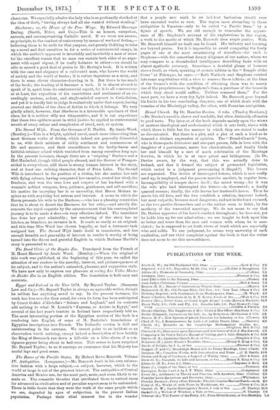Broad Church. By Dr. Maurice Davies. 3 vols. (Tinsley Brothers.)
—Dr. Davies's novel is clever and readable, but often distinctly offensive, to good taste. The interest of the book depends mainly upon the views of matters theological and ecclesiastical which it sets forth, views with which there is little but the manner in which they are stated to make us discontented. But there is a plot, and a plot of such a kind as to demand a distinct expression of opinion. The "Broad-Church" hero, who is three-parts littiratetir and one-part parson, falls in love with the daughter of a parishioner, moots her clandestinely, and finally binds her and himself by a sort of mock celebration of the Marriage Service, in which he is at once priest and bridegroom. (Is Dr. Davies aware, by the way, that this was actually done in Ireland, and that it formed the subject of protracted legislation, which ended in a judgment pronouncing it illegal ?) The 'ovens are separated. The device of intercepted letters, which is now really used up, is employed, and the parson marries another, in regular form. Incompatibility of temper shows itself ; the secret wrong—for it was the wife who had intercepted the letters—is discovered ; a deadly quarrel ensues ; finally, the wifo leaves her husband's house. Then he meets his old love, and the two establish a relation, innocent indeed, but most culpable, because most dangerous, and not in the least excused, as the two parties themselves and as the author seem to think, by the- mockery of the travestied marriage. Wo do not mean to say that Dr. Davies approves of his hero's conduct throughout ; ho does not, yet ho holds him up for our admiration ; wo are taught to look upon him as better and truer than the mon and women with whom ho is asso ciated ; he is supposed to set forth views of truth which are especially wise and noble. To our judgment, he seems very unworthy of such exaltation, and our chief complaint against the book is that the writer does not scorn to see this unworthiness.






































 Previous page
Previous page